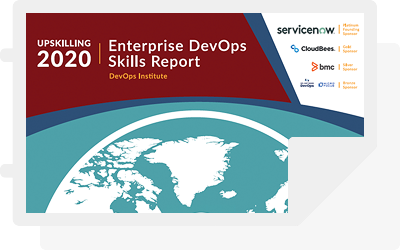For many companies, DevOps is no longer just a buzzword, but rather, an entire culture. With increasing demands for quicker developmental strategies and continuous application deployments, the need for skilled DevOps professionals is only going to compound in years to come.
Although the field is constantly innovating, the ability for DevOps professionals to prove their expertise isn’t always straightforward. Obtaining a DevOps certification is one way for potential job candidates and employees to validate and demonstrate their skills, offering a competitive edge over others vying for the same positions.
We have put together a complete guide on DevOps certifications including some of the top DevOps certifications currently in demand.
What is a DevOps certification?
A DevOps certification is a designation that demonstrates specific competency in skills and subject matter that are needed in order to be a successful DevOps professional. These various certifications are typically obtained following an assessment, educational course, or performance review and they prove that the candidate met rigorous standards.
Why should I consider a DevOps certification?
Obtaining a DevOps certification is beneficial for both securing a new position as well as advancing a current one. More than 91% of employers believe IT certifications play a significant role in the hiring process and that such certifications are reliable predictors of future employee success.
If you are looking to pivot into a new role or technology, a DevOps certification can help provide better job opportunities. According to research, 97% of HR professionals and hiring managers use certifications as a deciding factor between equally qualified candidates, while 98% use them to confirm a candidate’s subject matter expertise. As DevOps continues to be adopted in more organizations, the field will become increasingly competitive, making any type of solid evidence of DevOps expertise even more critical.
Even if you aren’t looking to change positions, the benefits of a DevOps certification are still applicable. One of the obvious ways is with improved skills and knowledge. The information you gain from a certification program will only enhance your current capabilities. By learning DevOps methodologies, you also learn how to work in a team of cross-functional team members, including QA, developers, operation engineers, and business analysts.
DevOps positions are consistently ranked among the highest paying salaries in the industry, especially those related to cloud. By obtaining an in-demand certification, you are not only increasing your chances of being offered one of these positions, but you are also improving your likelihood for bonuses, promotions, or pay bumps.
Top DevOps Certifications in 2019
Because DevOps is not a single tool but an entire practice that combines with other tools and technology, no one certification will cover it all. Instead, a variety of certifications prove beneficial for DevOps practitioners based on market needs and industry trends.
AWS Certified DevOps Engineer Professional
When it comes to DevOps, one of the first stops is Amazon Web Services. AWS provides services that are built first for use with AWS and help companies facilitate DevOps. Utilizing these tools help engineers automate manual tasks, manage complex environments at scale, and control high velocity applications.
The AWS Certified DevOps Engineer Professional certification is intended for individuals in a DevOps engineer role with 2+ years of experience provisioning, operating, and managing AWS environments.
Those who complete this certification will have expertise:
- Implementing and managing continuous delivery systems and methodologies on AWS
- Implementing and automating security controls, governance processes, and compliance validation
- Defining and deploying monitoring, metrics, and logging systems on AWS
- Implementing systems that are highly available, scalable, and self-healing on the AWS platform
- Designing, managing, and maintaining tools to automate operational processes
The AWS DevOps Engineer Professional exam is 170 minutes long with 40-65 multiple choice questions. The exam focuses on SDLC automation; configuration management and infrastructure as code; high availability, disaster recovery, and fault tolerance; incident and event response; monitoring and logging; and policies and standards automation.
Docker Certified Associate
The container management tool Docker is used in DevOps to manage software parts as isolated, self-sufficient containers that can be deployed and run in any environment. In today’s job market, candidates with Docker skills are highly sought.
The Docker Certified Associate (DCA) certification is designed to validate that skillset with real world questions designed by experienced Docker practitioners. As the first in a multi-tiered professional certification program, the DCA serves as a foundational benchmark for real world Docker skills across the container industry. This certification course is ideal for Docker practitioners with at 6+ months of experience.
The DCA exam is 90 minutes long and contains 55 multiple choice questions, proctored online. The test covers the basics of a Docker ecosystem such as:
- Orchestration
- Security
- Networking
- Installation and configuration
- Image creation
- Management
- Registry
- Storage
- Volumes
Kubernetes Certification
Kubernetes is an open-source container management system that automates the process of deploying and managing multi-container applications at scale. Kubernetes paves the way for DevOps by enabling the team to keep pace with the requirements for software development, making it a power player in the world of DevOps certifications.
The Cloud Native Computing Foundation (CNCF) and the Linux Foundation collaborated to organize the Kubernetes certification program which validates professionals working on this software. There are two certification options: Certified Kubernetes Administrator (CKA) and Certified Kubernetes Application Developer (CKAD).
Certified Kubernetes Administrator
The CKA program tests the skills, knowledge, and proficiency that a Kubernetes Administrator should possess. The CKA exam is online and consists of a performance-based set of problems that the candidate must solve in a command line within three hours. The test focuses on general Kubernetes features such as:
- Application lifecycle management
- Configuration
- Installation and validation
- Networking
- Scheduling
- Core concepts
- Security
- Cluster maintenance
- Storage
- Logging and monitoring
- Troubleshooting
Certified Kubernetes Application Developer
This CKAD certification is built for professionals that execute core practices of the Kubernetes ecosystem. Candidates should be skilled in designing, building, exposing, and configuring native cloud applications for Kubernetes. They should also be aware of application techniques for OCI-Compliant Container Runtime, Cloud native application concepts, infrastructure, and programming languages such as Python, Go, or Java.
This exam certifies a candidate’s experience, skills, application expertise, and familiarity with the Kubernetes environment. It lasts two hours and covers core concepts, configuration, multi-container pod, observability, pod design, and services and networking.
Azure DevOps Engineer Expert
Microsoft Azure is a cloud computing service similar to AWS and the Google Cloud Platform. It offers a wide variety of services, including web servers, email servers, databases, file storage servers, virtual machines, user directories, and more. Incorporating Azure and DevOps simplifies and speeds up the entire DevOps process, providing faster and more reliable deployments.
Among the several Azure certifications, Azure DevOps Engineer Expert certification validates the skills and expertise of Azure DevOps professionals specifically. Ideally, these Azure professionals will already be working as DevOps engineers, designing and implementing DevOps best practices for the version control, build, release, compliance, testing, and infrastructure as code by using Azure technologies.
The AZ-400 exam for Microsoft Azure DevOps Solutions certification exam contains 40-60 multiple choice questions and covers concepts like:
- Designing a DevOps strategy
- Implementing DevOps development processes
- Continuous integration
- Continuous delivery
- Application infrastructure
- Dependency management
- Continuous feedback
Puppet Certified Professional
Puppet is used by more than 35,000 organizations worldwide so the demand for engineers, administrators, developers, architects, and managers with Puppet experience is significant. The Puppet Certified Professional acknowledges talented candidates based on macro-level knowledge of Puppet IT automation software.
Ideal candidates should:
- Know how to use the Forge to find and Apply modules
- Be familiar with troubleshooting strategies for Puppet code and core Puppet platform components
- Understand classification strategies and ways by which one can set class parameters and variables
- Understand module testing practices, module structure, and design and arrangement of roles and profiles.
One of the top DevOps certifications is Puppet 206 – System Administration Using Puppet Exam. This exam has 60 multiple choice questions with 90 minutes to answer. Candidates can prepare for Puppet 2019 by opting for Puppet Practitioner Instructor-led training sessions and Puppet Enterprise Users Guide.
DevOps Institute
The DevOps Institute also offers multiple DevOps certifications:
- DevOps Foundation® Certification provides a baseline understanding of key DevOps terminology to ensure everyone is talking the same language and highlights the benefits of DevOps to support organizational success
- DevOps Leader (DOL)® is a unique and practical experience for participants who want to take a transformational leadership approach and make an impact within their organization by implementing DevOps.
- DevSecOps Engineering (DSOE)SM explains how DevOps security practices differ from other security approaches and provides the education needed to understand and apply data and security sciences.
- Continuous Delivery Architecture (CDA)SM is designed for participants who are engaged in the design, implementation, and management of DevOps deployment pipelines and toolchains that support Continuous Integration, Continuous Delivery, Continuous Testing and potentially Continuous Deployment.
- DevOps Test Engineering (DTE)® addresses testing in a DevOps environment and covers concepts such as the active use of test automation, testing earlier in the development cycle, and instilling testing skills in developers, quality assurance, security, and operational teams.
- Certified Agile Service Manager (CASM)® introduces agile service management, the application, and integration of agile thinking into service management processes and process design projects.
- Certified Agile Process Owner (CAPO)® dives into the process owner responsibilities so they can describe what they are doing as a process and provides the education needed to oversee the design, re-engineering and improvement of ITSM processes, particularly in the context of Agile Service Management.
Importance of Certifications for DevOps
As technology continues to evolve, so do companies, and regardless of their industry every company is starting to become a technology company. With these changes becoming the heart of business, there’s no doubt that DevOps is at the core, proving itself vital for the success of future engineers. By obtaining one of these valuable DevOps certifications, engineers ensure not only that they remain competitive in their field, but that they remain ahead of the entire curve.






